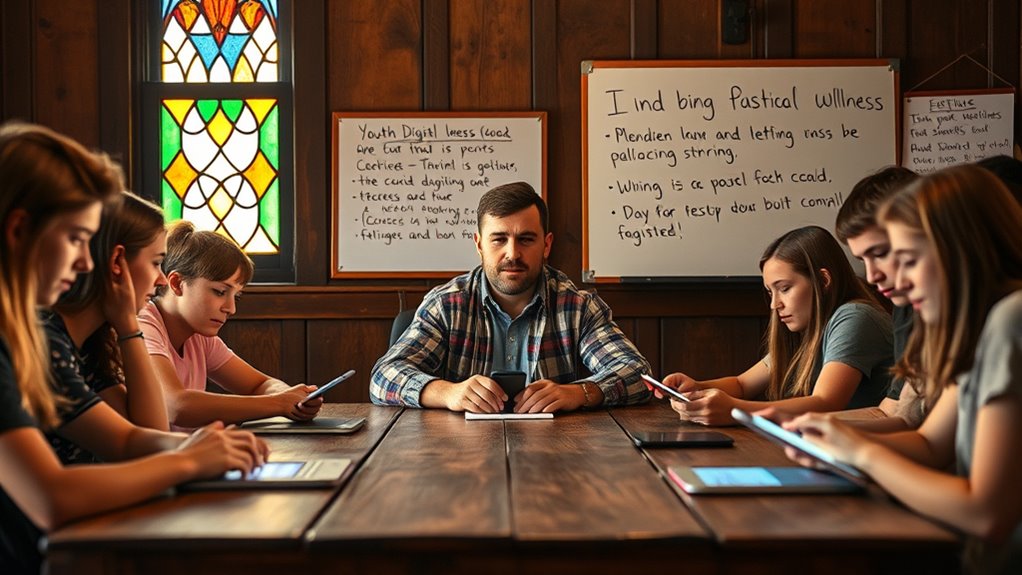To manage digital fatigue in youth ministry, encourage teens to take regular breaks from screens and promote offline activities like outdoor events or service projects. Model balanced digital habits by limiting your own device use during gatherings and staying present. Educate teens on how excessive screen time impacts their mood and focus, and introduce strategies like digital detox challenges or intentional social media limits. Continue exploring ways to support their emotional well-being and foster healthier digital habits.
Key Takeaways
- Promote offline activities like outdoor events and service projects to reduce screen dependence and foster real-world connections.
- Educate teens on digital fatigue’s impact on emotional health and encourage mindful, intentional screen use.
- Model healthy digital habits by limiting personal device use during youth activities and staying present.
- Implement scheduled digital detoxes or device-free times to help teens develop balanced digital routines.
- Recognize signs of digital fatigue and provide support through reflection activities that reduce mental clutter and promote emotional well-being.

In today’s youth ministry landscape, digital devices and social media are essential tools for engagement, but they can also lead to digital fatigue among young people. As you encourage teens to connect online, it’s important to recognize that excessive screen time can take a toll on their mental health. When young people spend hours scrolling through feeds, messaging friends, or gaming, they risk feeling overwhelmed, anxious, or drained. The constant influx of notifications and digital interactions can create mental clutter, making it harder for them to focus, relax, or feel truly present.
You might notice that after a long day of screen use, many teens seem tired, irritable, or disconnected. That’s because digital fatigue isn’t just about being tired of screens; it’s about how overexposure affects their emotional well-being. Too much screen time can lead to feelings of loneliness, low self-esteem, and stress, especially when social media comparisons or cyberbullying come into play. As a youth leader, it’s your role to help young people find a healthy balance, guiding them to manage their digital consumption without feeling deprived or isolated.
Digital fatigue impacts teens’ emotional health, leading to loneliness, low self-esteem, and stress.
Encouraging intentional screen use is key. You can suggest activities that promote offline connection and reflection, like outdoor events, small group discussions, or service projects. These experiences help teens step away from their devices and foster genuine relationships. Additionally, educating them about the importance of mental health can empower them to recognize when their digital habits are harming their well-being. For instance, discussing how excessive screen time can interfere with sleep patterns, increase anxiety, or diminish their mood can motivate teens to set boundaries.
You should also model healthy digital habits yourself. Limit your own screen time during youth activities and demonstrate how to stay present and engaged. Invite teens to participate in digital detox challenges or scheduled breaks from social media. When they see that managing digital consumption is a priority for you, they’re more likely to adopt these habits themselves. Remember, the goal isn’t to eliminate technology but to use it mindfully, ensuring it enhances rather than diminishes their mental health.
Finally, understanding the concept of digital fatigue as a form of mental clutter can help you better address its impact and develop effective strategies to counteract it. Ultimately, managing digital fatigue isn’t about avoiding screens altogether; it’s about teaching young people to use technology intentionally and responsibly. By fostering awareness of how screen time impacts mental health, and encouraging balanced habits, you can help teens develop resilience and well-being in a digital age. Your leadership can make a significant difference in helping them navigate online life without sacrificing their emotional health or spiritual growth.
Frequently Asked Questions
How Can Youth Leaders Identify Signs of Digital Fatigue Early?
You can spot digital fatigue early by paying attention to your youth’s digital boundaries and emotional resilience. Notice if they seem withdrawn, irritable, or overly exhausted after screen time. Look for signs like difficulty concentrating or losing interest in activities they once enjoyed. By fostering open conversations, you help them set healthy boundaries and build emotional resilience, preventing digital fatigue from escalating and supporting their overall well-being.
What Are Effective Offline Activities to Reduce Screen Time?
You can reduce screen time by organizing outdoor games and creative workshops. Outdoor activities like relay races or scavenger hunts engage youth physically and socially, giving them a break from screens. Creative workshops, such as painting or DIY crafts, foster hands-on learning and self-expression. These activities help youth disconnect from digital devices, promote meaningful interactions, and refresh their minds, making your youth ministry more balanced and engaging.
How Can Parents Support Youth in Managing Digital Fatigue?
You can support youth by encouraging regular digital detox periods and helping them set healthy boundaries around screen time. Talk openly about the importance of unplugging and create tech-free zones or times at home. By setting clear boundaries, you empower them to manage digital fatigue effectively. Offer alternative offline activities that interest them, and be a positive role model by practicing these habits yourself.
Are There Recommended Apps or Tools to Monitor Digital Usage?
Imagine you’re tracking your teen’s screen time with an app like Qustodio, which promotes digital wellness. These tools monitor digital usage, helping you set healthy boundaries and understand patterns. Many apps, such as Screen Time or Family Link, offer real-time monitoring and activity reports. Using these apps encourages responsible digital habits, prevents fatigue, and fosters open conversations about healthy tech use, all while giving you peace of mind.
How Does Digital Fatigue Impact Mental Health in Teens?
Digital fatigue impacts your teen’s mental health by increasing emotional exhaustion and causing stress. Excessive screen time can lead to feelings of burnout, making it harder for teens to focus and regulate emotions. They might feel overwhelmed or anxious, which affects their overall well-being. As youth leaders, you can help by encouraging breaks from screens and promoting healthy digital habits to support their mental health and emotional resilience.
Conclusion
Ultimately, by gently tending to digital boundaries, you create a space where young hearts can reconnect with genuine moments of faith and fellowship. Embracing a mindful approach helps ease the subtle weight of constant connectivity, allowing youth to flourish spiritually without feeling overwhelmed. Your thoughtful efforts cultivate a sanctuary where balance is restored, and digital fatigue softly recedes, making room for meaningful growth and renewed purpose in their spiritual journey.










